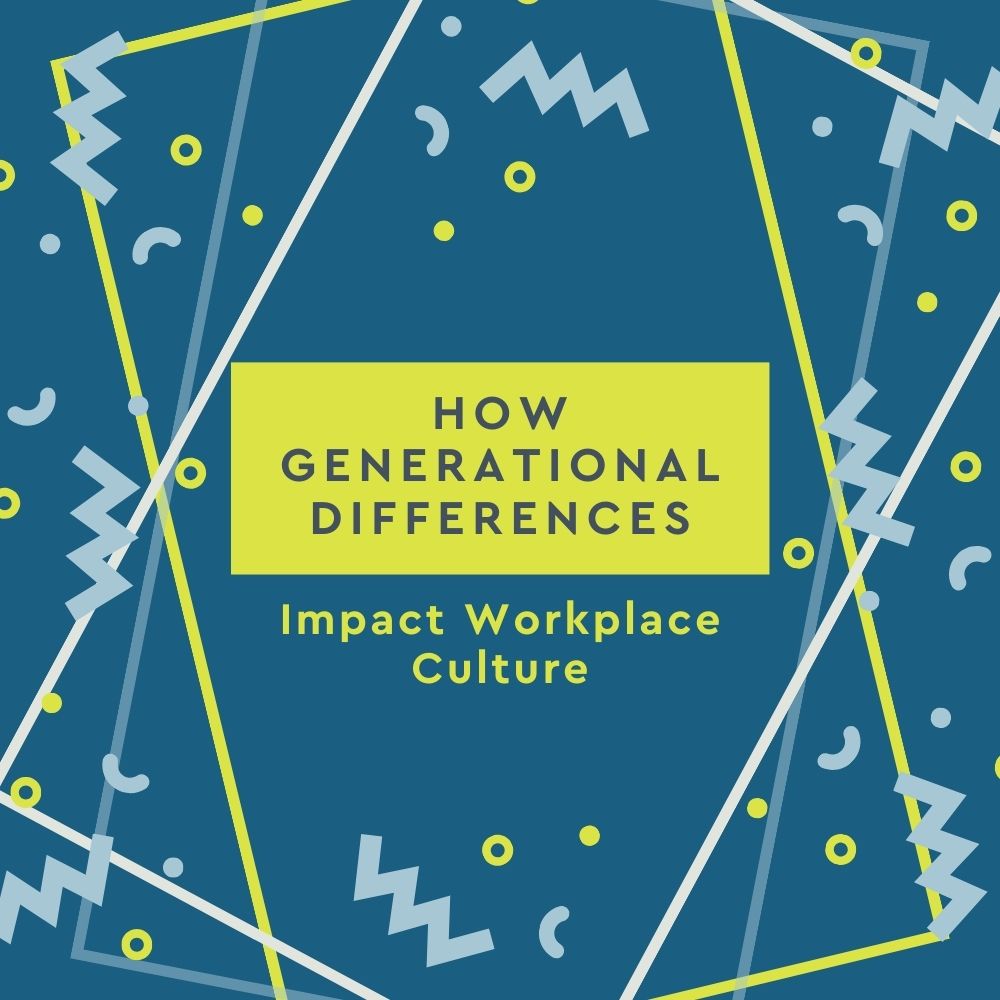A manager kept asking the vice president of her company for a promotion. The VP repeatedly asked her to define her new role. In turn, the manager asked her boss again and again to define his expectations for the role. Around and around they went.
The Millennial manager felt it was the her boss’ responsibility to acknowledge her expanded responsibilities and provide feedback on how she was handling them and what she could do to move up. She wanted direction and clarity around expectations and a clear path to grow.
The VP, who is from Generation X, never promoted the manager because he didn’t think she was ready based on her inability to communicate her role and draft a detailed job description.
The story shows what can happen when generational differences between managers and employees cause communications breakdowns. As interns to senior executives gather together in conference rooms and on Zoom calls, age diversity in today’s workforce is more apparent than ever.
With four generations working side by side, it becomes increasingly important to understand what each group needs and expects at work. Your awareness of generational differences directly correlates with your ability to communicate effectively, create authentic connections, and build a meaningful workplace culture.
Characteristics of each workplace generation
Baby Boomers (born 1946-1964)
Baby boomers want job security. They’re loyal, hardworking and tend to stay with the same company. Boomers believe promotions should be earned over time based on rank and tenure, and expect to be awarded with prestigious job titles. They don’t require frequent feedback and are likely to assume all is well unless someone says otherwise.
It’s a myth that Boomers can’t use technology; they just use it differently than younger generations. Megan Gerhardt, author of Gentelligence: The Revolutionary Approach to Leading an Intergenerational Workforce, described a situation where younger workers at a business texted their ideas and questions to each other. “The older people would not respond, though, and the younger colleagues felt disrespected and thought it was because their elder counterparts were not enthusiastic,” Gerhardt told Time. “It turns out that the reticence to engage was driven by evening hours being reserved for personal time or family, and the feeling that text was not the right forum for work communications.”
Gen X (born 1965-1980)
Gen Xers value independence and prefer to work with minimal supervision. They tend to seek fulfillment in their personal lives more than their jobs.
GenX workers were the first generation to strive for a healthy work-life balance. For this reason, they appreciate flexible work schedules. A survey by career site Zety found that 26% of GenXers would leave a job if they were required to work overtime regularly. Yet, 82% of respondents say they work more than is officially required.
Gen Xers believe promotions should be based on competence, not on rank or age seniority. They value recognition from their manager and financial bonuses.
GenXers share some qualities with Baby Boomers and younger generations. When asked what they value most from work, 40% of females and 30% of males surveyed by Zety chose job security. In addition, 86% claimed a sense of purpose was essential to them.
Millennials aka Gen Y (born 1982-1996)
Millennials need to feel that their work has meaning. Workplace culture is extremely important to them and they want to build relationships. They are willing to move around to find the right fit and the best deal, so employers have to work to keep them. Millennials want to be evaluated not by how many hours they put in but for their results. They are ambitious and believe in working smarter, not harder.
Millennials want regular feedback, clear directions, structure, and transparency. Like the generation before them, they are motivated by flexible schedules, recognition, and financial incentives.
Millennials are often managed by Gen Xers, who are used to going it alone and don’t always understand how important feedback is to their teams. In fact, Gallup research shows only 17% of Millennials report receiving the meaningful feedback they need to grow and improve. The study also found Millennials aren’t likely to speak up and ask for feedback.
“Millennials need to feel like their manager is in their corner before they feel comfortable describing what’s meaningful to them. They need to know it’s okay (even encouraged) to talk to their boss about development,” Gallup said.
Gen Z (born 1997-2012)
GenZers are entering the workforce with big plans for the future. For many of them, their ultimate long-term career goal is to make the world a better place. Zety found that 71% of Gen Z workers would take a pay cut to do meaningful work.
They want continual feedback from their bosses, connections with their coworkers, and growth opportunities. Among GenZers surveyed by Zety, 53% want a manager who has strong coaching skills and can impart knowledge.
GenZers seem to be struggling more than others with mental health issues at work. In an article published pre-COVID, the American Psychological Association declared Gen Z as the most stressed generation. They’re worried about current events and are more likely to report their mental health as fair or poor.
It should come as no surprise then that GenZers want a boss who expresses concern for their well-being.
Generational differences in the human era
Many Boomer and GenX leaders operate from a production mindset. Hit the KPIs and I’m good.
This mode of thinking started back during the Industrial Revolution when managers were invented to keep the assembly line moving and carried over into the Information Age when meeting project outcomes and efficiencies determined performance.
However, these ideas are out of date. We’ve entered the Human Era. The success of your business is no longer measured in widgets and numbers.
Managers need to adopt a human-centric focus to connect with Millennials and GenZ workers and establish the meaningful culture that younger generations expect. Leaders who don’t will be left wondering why their team members quit.
To accomplish this, bosses need to lead with authenticity, prioritize psychological safety, and become mentors and coaches. All of these skills can be learned. Appreciating how others on your team are different from you is an important first step.



